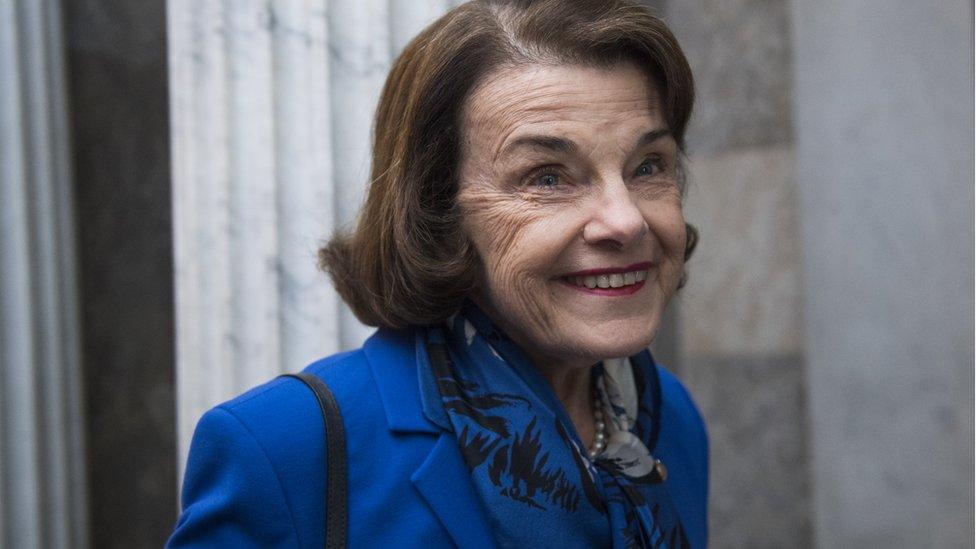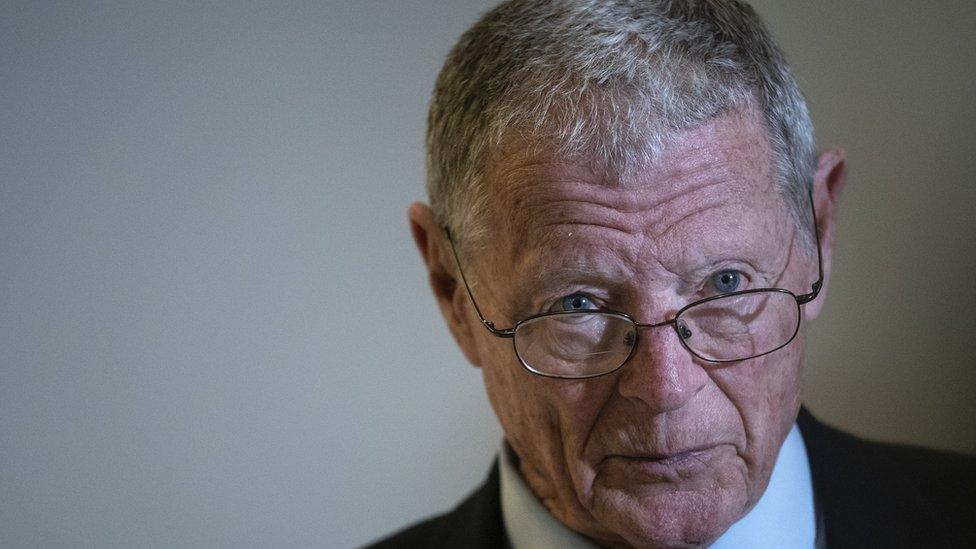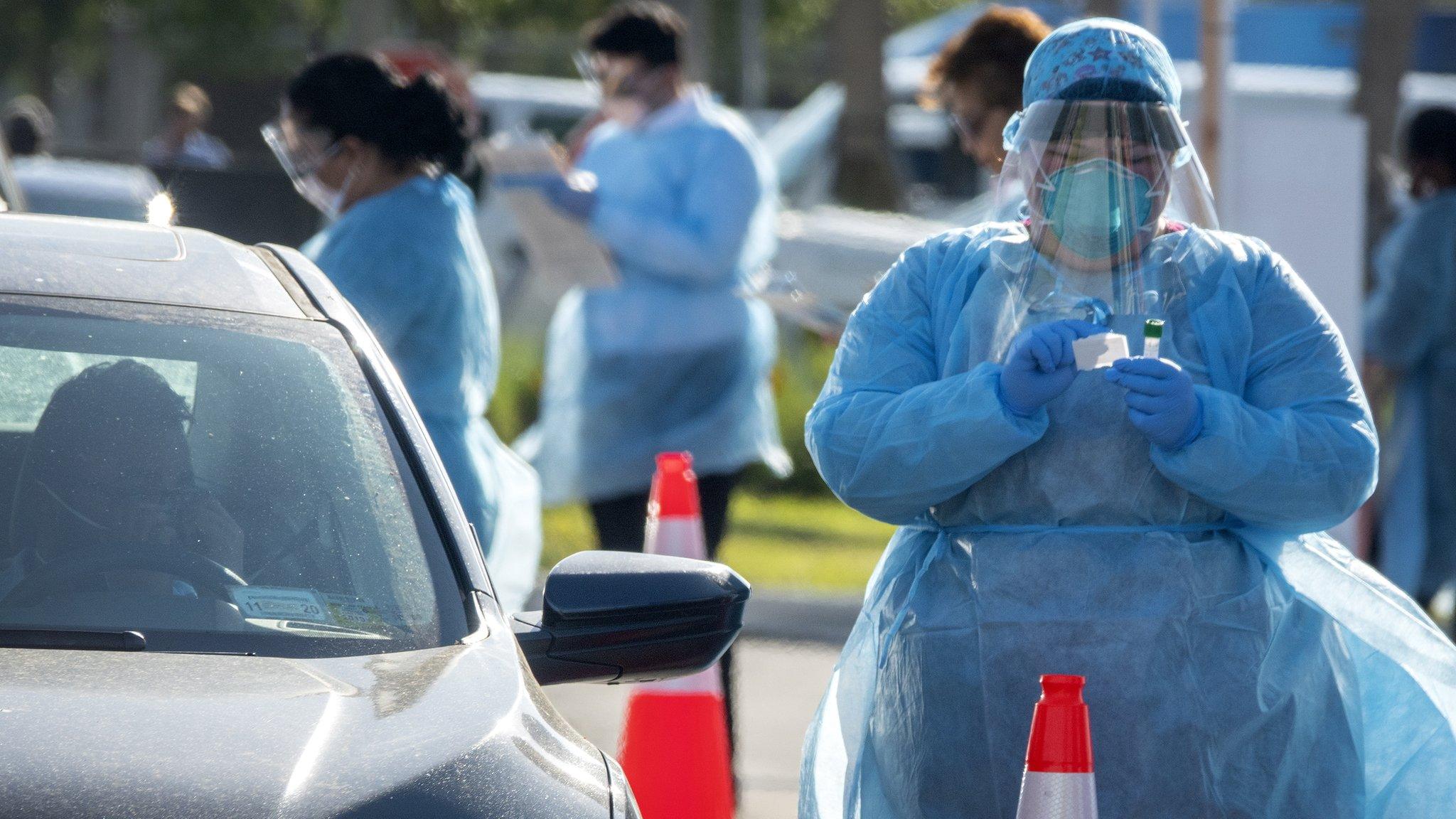Coronavirus: US Senators face calls to resign over ‘insider trading’
- Published

Richard Burr is chairman of the Senate Intelligence Committee while Kelly Loeffler sits on the Senate Health Committee
Four US senators are under scrutiny over claims they used insider knowledge about the impending coronavirus crisis to sell shares before prices plummeted.
Republicans Richard Burr and Kelly Loeffler face calls to quit after selling millions in stocks last month.
James Inhofe, a Republican, and Dianne Feinstein, a Democrat, also reportedly sold holdings at the time.
It is illegal for Congress members to trade based on non-public information gathered during their official duties.
All four senators deny any impropriety.
Mr Burr, of North Carolina, reportedly dumped up to $1.7m (£1.45m) of stocks last month.
Mrs Loeffler, of Georgia, is reported to have sold holdings worth up to $3m in a series of transactions beginning the same day as a Senate briefing on the virus.
Mr Burr, chairman of the Senate Intelligence Committee, has also come under fire after US outlet NPR obtained a recording of him warning a group of wealthy constituents last month, external about the dire economic impact of the coronavirus, at a time when the Trump administration was publicly downplaying the threat. He also told the group to curtail their travel.
Mr Burr has accused NPR of “misrepresenting” his speech.
60 days of coronavirus in the US - in 60 seconds


A SIMPLE GUIDE: What are the symptoms?
YOUR THIRD HAND: How do you clean your smartphone?
BORED KIDS: Should you let your children play with others?
GETTING READY: How prepared is the US?
DOING GOOD: Kind Canadians start 'caremongering' trend

The latest revelations come after an investigation by ProPublica into his financial filings. , external
As chairman of the Senate Intelligence Committee, Mr Burr receives nearly daily briefings on threats to US national security.
On 7 February, shortly after the first case of coronavirus was reported, Mr Burr wrote on Fox News that the US government was “better prepared than ever” to tackle an outbreak.
But a week later, when President Donald Trump assured the public that the virus would not hit America hard, Mr Burr and his wife sold between $628,000 and $1.72m in stocks, including shares in two hotel groups. Two weeks after that, he gave the speech obtained by NPR.
Among those calling for his resignation and investigation are Fox News host Tucker Carlson, usually a supporter of Republicans.
The presenter said that unless an honest explanation for Mr Burr's stock sell-off was forthcoming, "he must resign from the Senate and face prosecution for insider trading".
Several of the stocks that Mr Burr sold, including in the hotel and travel industry, have since lost value.
On Friday, Mr Burr again responded, tweeting that his decision to sell stock was made "solely based on public news reports". He specifically cited the Asia coverage provided by the CNBC network.
"Understanding the assumption many could make in hindsight however," he said in a short statement, "I spoke with the chairman of the Senate Ethics Committee this morning and asked him to open a complete view of the matter with full transparency."

A recipe for political upheaval

In these early days of the coronavirus crisis, the American people have shown a significant capacity to endure hardships to slow the spread of the virus. They've stayed in their homes and watched as the economy crumbled around them. Many have confronted the loss of income and wealth with no guarantee these setbacks are only temporary.
What they may not abide, however, is the prospect that the rich and influential have used their positions of power to avoid the worst consequences of this financial collapse - particularly as their leaders were telling them to hold fast.
That's why the stories of senators selling stock portfolios in anticipation of a market drop are so toxic. It's a controversy that cuts across normally impervious partisan lines and has even conservatives and those "close to the president" sharply criticising the Republicans, like North Carolina Senator Burr, at the centre of the fury.
This story comes on the heels of grumbling over how some of the well-connected were getting virus tests while most Americans had to wait. It's a sign that this pandemic could lay bare the sharp divides in the US between the haves and the have-nots and make more than a few realise that - perhaps to their surprise - they are among the latter, not the former.
That's a recipe for political upheaval.

Separately, an investigation by the Daily Beast, external found Mrs Loeffler, who sits on the Senate Health Committee, and her husband sold millions of dollars in stocks, beginning on 24 January, the day her panel received a private briefing on the coronavirus from top US public health officials.
In the weeks after the sale, she sought to downplay the virus’ impact on the economy and public health in a series of tweets.
“Democrats have dangerously and intentionally misled the American people on #Coronavirus readiness,” she tweeted on 28 February. , external
“Here’s the truth: @realDonaldTrump & his administration are doing a great job working to keep Americans healthy & safe.”
Students on spring break defy Covid-19 warnings
At least $100,000 of stock in a teleworking software company, Citrix, was also reportedly bought in Mrs Loeffler's name. The shares have risen during the pandemic.
Mrs Loeffler has called the Daily Beast's investigation a “ridiculous and baseless attack”.
In a statement, she said decisions about her investments were made by “multiple third party advisors without [her or her husband’s] knowledge or consent”.

Ms Feinstein and her husband reportedly sold stock worth up to $6m
Mrs Loeffler is married to the chairman of the New York Stock Exchange and is thought to be the wealthiest member of Congress, with an estimated fortune of $500m.
Mr Inhofe sold $400,000 of stock at the end of January, according to a Senate disclosure report, including shares in Apple, PayPal and a real estate company.
The senator for Oklahoma responded in a statement that his financial adviser made the decisions for him, and he was "not aware of or consulted about any transactions".

James Inhofe of Oklahoma
The senator said he had told his adviser to move into mutual funds after he became chairman of the armed services committee in 2018, and he said these share sales were part of those transactions.
Top California Democrat Ms Feinstein and her husband meanwhile reportedly sold stock worth between $1.5m and $6m in a biotech company between the end of January and mid-February.
A spokesman for the senator, who is a member of the intelligence committee, told the New York Times her assets were in a blind trust and she had "no involvement in her husband's financial decisions".
The US government has come under criticism for its early response to the outbreak - testing and tracing for the virus has lagged far behind that of other countries, and the president initially downplayed the threat caused by the virus.
More than 14,000 cases of coronavirus have been reported in the US, along with 205 virus-related deaths, according to Johns Hopkins University., external
- Published19 March 2020

- Published20 March 2020
